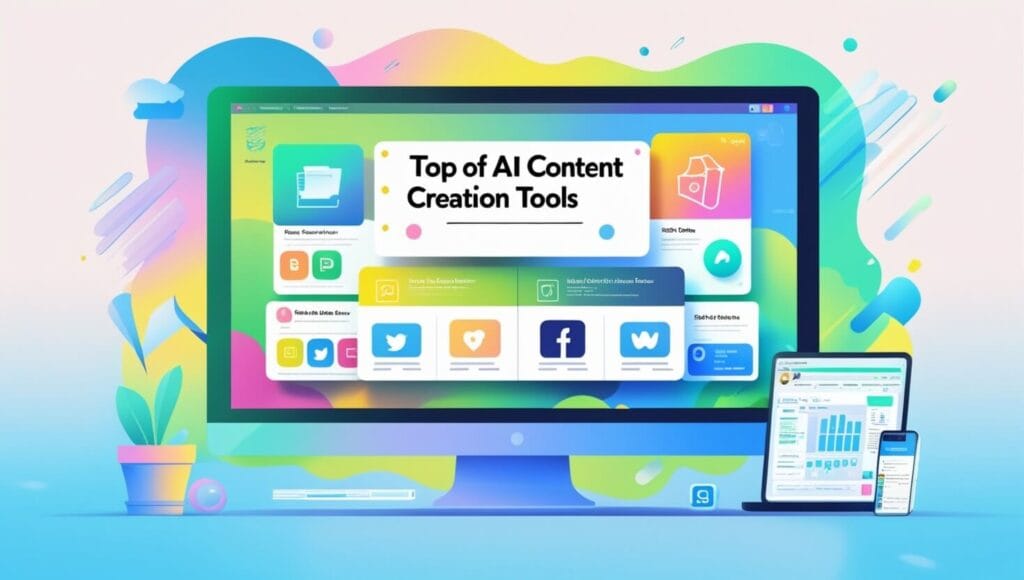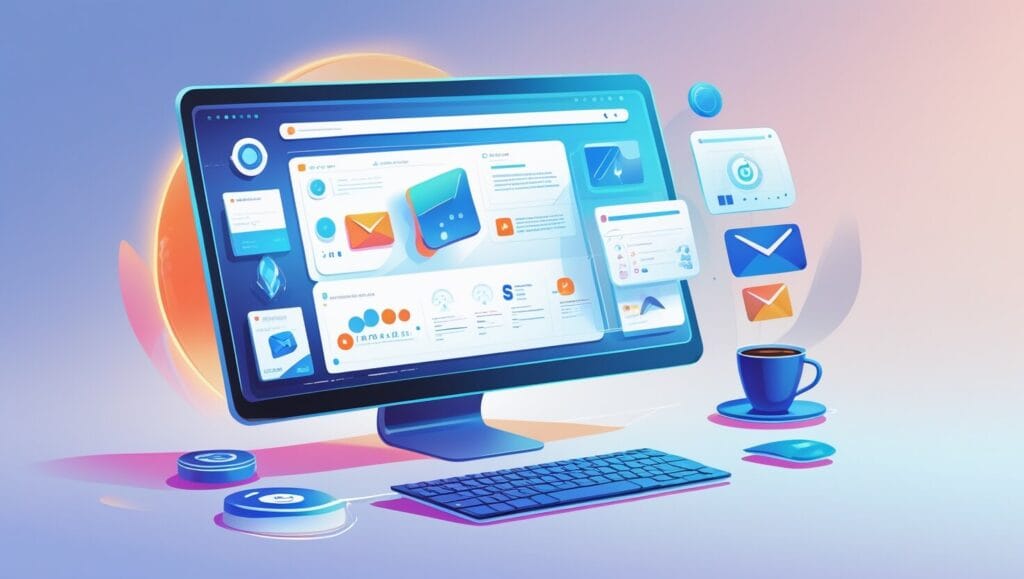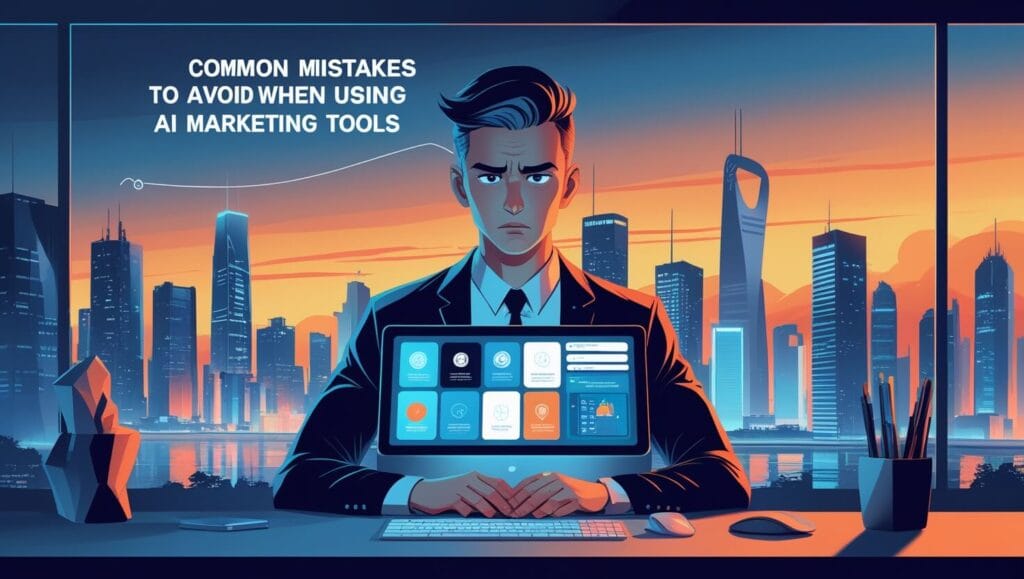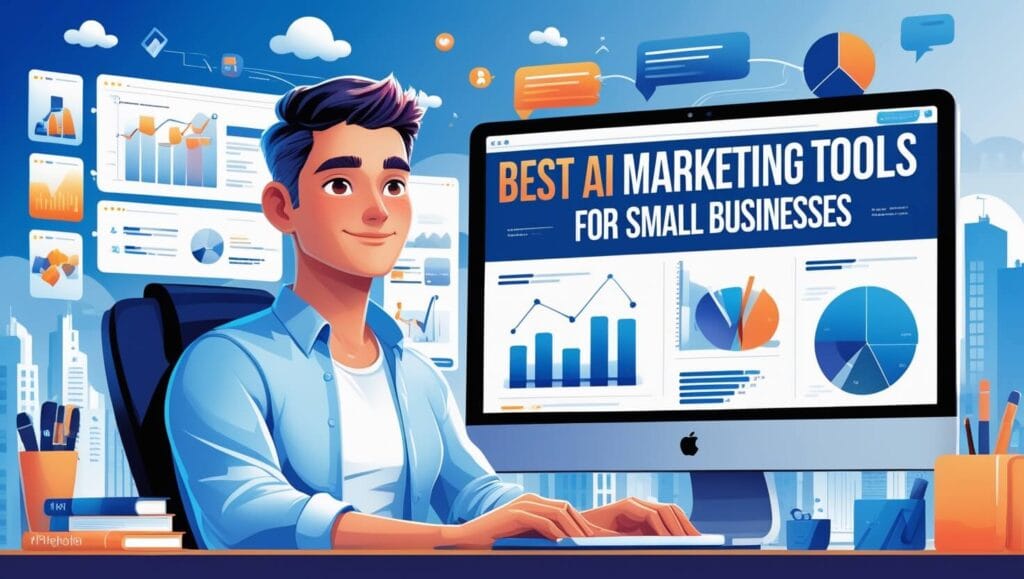
Why Every Small Business Needs AI Marketing Tools
I’ll be honest with you – when I first heard about AI marketing tools for small businesses, I was skeptical. Like many small business owners, I thought artificial intelligence was just for big corporations with massive budgets. Boy, was I wrong! After spending the last three years helping dozens of small businesses implement AI marketing solutions, I can confidently say that these tools are game-changers.
Here’s a stat that’ll blow your mind: businesses using AI marketing tools see an average ROI increase of 37% within the first year. That’s not just some fancy corporate jargon – that’s real money back in your pocket. I’ve watched a local bakery increase their online orders by 150% using AI-powered social media tools, and I’ve seen a plumbing company reduce their customer acquisition cost by 40% with smart chatbots.
The truth is, AI marketing tools for small businesses aren’t just nice-to-have anymore – they’re essential for staying competitive in today’s digital landscape. Whether you’re struggling to create consistent content, manage customer inquiries, or optimize your advertising spend, there’s an AI solution that can help. And the best part? Many of these tools are surprisingly affordable, even for businesses operating on shoestring budgets.
What Are AI Marketing Tools and Why Should Small Businesses Care?

Let me break this down in simple terms because I remember being confused about this stuff too. AI marketing tools for small businesses are software applications that use artificial intelligence to automate, optimize, and enhance various marketing activities. Think of them as your digital marketing assistants that never sleep, never take vacation days, and continuously learn to get better at their jobs.
These tools can handle everything from writing social media posts and email campaigns to analyzing customer behavior and predicting which leads are most likely to convert. I’ve seen small business owners go from spending 20 hours a week on marketing tasks to just 5 hours, while actually getting better results. It’s like having a marketing team working around the clock, except you’re only paying a fraction of what you’d spend on hiring actual employees.
What makes AI marketing tools particularly valuable for small businesses is their ability to level the playing field. You don’t need a huge marketing department or years of experience to leverage sophisticated marketing strategies. The AI does the heavy lifting, while you focus on what you do best – running your business.
The key benefits that I’ve observed across various small businesses include:
- Time savings: Automating repetitive tasks like social media posting, email follow-ups, and basic customer service
- Cost reduction: Reducing the need for large marketing teams or expensive agencies
- Better targeting: Using data analysis to identify and reach your ideal customers more effectively
- Improved personalization: Delivering customized experiences that increase engagement and conversions
- 24/7 availability: Providing customer support and lead generation even when you’re not working
Top AI Content Creation Tools for Small Business Marketing

Content creation used to be my biggest nightmare. I’d sit there staring at a blank screen for hours, trying to come up with engaging social media posts or blog ideas. Then I discovered AI content creation tools, and honestly, it changed everything about how I approach marketing for small businesses.
Jasper AI has become my go-to recommendation for small businesses that need consistent, high-quality content. What I love about Jasper is that it’s specifically designed for marketing content – not just generic writing. You can create everything from Facebook ad copy to email subject lines, and the tool learns your brand voice over time. I worked with a local fitness studio that was struggling to maintain their social media presence, and after implementing Jasper, they went from posting once a week to daily posts that actually engaged their audience. The owner told me it saved her about 10 hours per week, which she could then spend on actual training sessions with clients.
Copy.ai is another fantastic option, especially for businesses just starting with AI marketing tools for small businesses. It’s more affordable than some alternatives and offers templates for virtually every type of marketing content you can imagine. The interface is super user-friendly – even my least tech-savvy clients pick it up quickly. One of my favorite features is their “Brand Voice” setting, which ensures all your content maintains consistency across different platforms and campaigns.
ChatGPT for Business deserves a special mention here because it’s incredibly versatile and cost-effective. While it’s not specifically a marketing tool, I’ve helped numerous small businesses use it for content brainstorming, customer service scripts, and even product descriptions. The key is learning how to write effective prompts – something that takes a bit of practice but pays off enormously once you master it.
Here are some specific ways these AI content tools can transform your small business marketing:
- Blog post generation: Create SEO-optimized articles that attract potential customers
- Social media content: Generate engaging posts for Facebook, Instagram, LinkedIn, and Twitter
- Email marketing: Craft compelling subject lines and email body content that improve open rates
- Ad copy creation: Write persuasive advertisements for Google Ads, Facebook Ads, and other platforms
- Product descriptions: Generate compelling descriptions that highlight benefits and drive sales
The mistake I see many small business owners make is thinking they need to replace human creativity entirely. That’s not the goal. These AI marketing tools for small businesses work best when they’re used to enhance and accelerate your creative process, not replace it completely.
AI Email Marketing Platforms

Email marketing remains one of the highest ROI marketing channels, and AI has made it even more powerful for small businesses. I’ve personally seen open rates increase by 25-40% when businesses switch from generic email blasts to AI-powered personalized campaigns.
Mailchimp has really stepped up their AI game recently. Their predictive analytics feature can predict when subscribers are most likely to unsubscribe, allowing you to re-engage them before they leave. I worked with a small e-commerce business that was hemorrhaging email subscribers, and after implementing Mailchimp’s AI recommendations, their unsubscribe rate dropped by 60%. The platform also offers send time optimization, which automatically determines the best time to send emails to each individual subscriber based on their past behavior.
ConvertKit is particularly strong for small businesses in the creative and educational spaces. Their AI-powered automation sequences are incredibly sophisticated – you can create customer journeys that respond to subscriber behavior in real-time. For instance, if someone clicks on a link about a specific product but doesn’t purchase, the AI can automatically send them a follow-up sequence focused on that particular interest. I’ve seen conversion rates double when businesses implement these behavior-triggered sequences properly.
ActiveCampaign combines email marketing with CRM functionality, making it one of the most comprehensive AI marketing tools for small businesses. Their machine learning algorithms can score leads based on likelihood to purchase, helping you prioritize your sales efforts. The predictive sending feature has been a game-changer for many of my clients – it analyzes when each contact is most likely to engage and sends emails at those optimal times.
The AI features that provide the most value for small businesses include:
- Send time optimization: Automatically determining the best time to send emails to each subscriber
- Subject line optimization: A/B testing and optimizing subject lines for maximum open rates
- Content personalization: Customizing email content based on subscriber preferences and behavior
- Predictive analytics: Identifying subscribers who are likely to churn or convert
- Automated segmentation: Grouping subscribers based on behavior, demographics, and preferences
- Performance optimization: Continuously improving campaign performance through machine learning
One thing I always tell small business owners is that the key to successful AI email marketing isn’t just choosing the right tool – it’s about setting up your data collection properly from the start. The more information these AI systems have about your subscribers, the better they can personalize and optimize your campaigns.
AI-Powered Social Media Management Solutions

Managing social media can be overwhelming for small business owners. Trust me, I’ve been there – trying to post consistently across multiple platforms while running a business is like juggling flaming torches while riding a unicycle. That’s where AI social media tools come to the rescue.
Hootsuite Insights uses AI to analyze your social media performance and suggest optimal posting times, content types, and hashtags. But what really impressed me was their sentiment analysis feature. I had a restaurant client who was getting mixed reviews, and Hootsuite’s AI helped identify specific themes in customer feedback that weren’t obvious at first glance. This allowed the owner to address underlying issues before they became bigger problems.
Buffer has integrated AI features that I find particularly useful for small businesses. Their AI assistant can suggest hashtags, optimal posting times, and even help brainstorm content ideas based on your industry and audience engagement patterns. The reporting features use machine learning to identify which types of posts perform best, helping you double down on content that actually drives results.
Sprout Social offers some of the most advanced AI marketing tools for small businesses in the social media space. Their Smart Inbox uses natural language processing to categorize and prioritize messages, making it easier to respond to important customer inquiries quickly. The ViralPost feature analyzes your audience’s online behavior to recommend the best times to post for maximum engagement.
What I love about these AI-powered social media management solutions is how they handle the analytical heavy lifting:
- Content optimization: Analyzing which posts perform best and suggesting similar content
- Audience insights: Understanding your followers’ demographics, interests, and online behavior
- Competitor analysis: Tracking competitor performance and identifying opportunities
- Hashtag suggestions: Recommending relevant hashtags based on content and trending topics
- Engagement prediction: Forecasting which posts are likely to perform well before publishing
- Crisis detection: Identifying potential PR issues before they escalate
I worked with a small boutique that was struggling to gain traction on Instagram. After implementing AI-powered posting schedule optimization and content suggestions, their engagement rate increased by 180% in just three months. The owner went from posting randomly whenever she remembered to having a strategic, data-driven approach that actually drove foot traffic to her store.
Customer Service and Chatbot AI Tools

Here’s something that might surprise you – I used to hate the idea of chatbots. They felt impersonal and robotic. But modern AI customer service tools have come so far that they’re actually enhancing the customer experience rather than detracting from it. And for small businesses, they’re absolute lifesavers.
Intercom has developed one of the most sophisticated AI customer service platforms I’ve encountered. Their Resolution Bot can handle up to 67% of customer inquiries without human intervention, but here’s the kicker – customers often don’t even realize they’re talking to a bot. The AI is trained on your specific business knowledge and can handle complex queries about products, services, pricing, and policies. I set this up for a small software company, and they reduced their customer service response time from 4 hours to 30 seconds for common inquiries.
Drift specializes in conversational marketing, which is perfect for small businesses looking to generate more leads from their website traffic. Their AI chatbots can qualify leads, schedule appointments, and even route high-value prospects directly to sales calls. The qualification process is surprisingly sophisticated – the AI asks contextual questions based on the visitor’s behavior on your website and can determine buying intent with remarkable accuracy.
Zendesk Answer Bot integrates seamlessly with existing customer service workflows. What makes it special for small businesses is that it learns from your previous customer interactions and gets smarter over time. If a customer asks a question that the bot can’t answer, it escalates to a human agent and then learns from that interaction for future similar queries.
The customer service benefits that AI tools provide for small businesses are substantial:
- 24/7 availability: Providing instant responses to customer inquiries outside business hours
- Consistent service quality: Ensuring every customer receives accurate, helpful information
- Cost reduction: Handling routine inquiries without requiring additional staff
- Lead qualification: Identifying and prioritizing high-value prospects automatically
- Multi-language support: Communicating with customers in their preferred language
- Integration capabilities: Working seamlessly with existing CRM and help desk systems
One of my favorite success stories involves a small plumbing company that implemented an AI chatbot on their website. The bot could handle appointment scheduling, provide pricing estimates for common services, and answer frequently asked questions about emergency repairs. The result? They increased their conversion rate from website visitors to booked appointments by 45%, and the owner could focus on actual plumbing work instead of spending hours on the phone with potential customers.
AI Analytics and Data Insights Platforms

Data analysis used to be something only big companies with dedicated analysts could do effectively. Now, AI marketing tools for small businesses can provide insights that rival what Fortune 500 companies were getting just a few years ago. The key is finding platforms that translate complex data into actionable recommendations.
Google Analytics 4 with AI Insights is free and incredibly powerful. The AI-powered insights feature automatically identifies trends, anomalies, and opportunities in your data that you might miss otherwise. I remember working with a small online retailer who discovered through GA4’s AI insights that customers from a specific geographic region had a 300% higher lifetime value than average. This led to a targeted regional marketing campaign that significantly improved their ROI.
Hotjar combines traditional analytics with AI-powered behavioral insights. The AI analyzes user recordings and heatmaps to identify patterns in how visitors interact with your website. It can automatically flag pages with high drop-off rates, identify elements that confuse users, and suggest specific improvements. For small businesses, this is like having a user experience expert constantly monitoring your website and providing recommendations.
SEMrush has integrated AI features that make competitor analysis and keyword research incredibly sophisticated. Their AI can identify content gaps in your marketing strategy, suggest new keyword opportunities, and even predict which content topics are likely to perform well in your industry. The Position Tracking tool uses machine learning to forecast ranking improvements and estimate the impact of SEO changes before you implement them.
The analytical capabilities that provide the most value for small businesses include:
- Predictive analytics: Forecasting customer behavior, sales trends, and market opportunities
- Customer segmentation: Automatically grouping customers based on behavior and preferences
- Attribution modeling: Understanding which marketing channels drive the best results
- Conversion optimization: Identifying website elements that impact purchase decisions
- Competitive intelligence: Monitoring competitor strategies and market positioning
- ROI tracking: Measuring the financial impact of different marketing activities
I worked with a small consulting firm that was spending money on five different marketing channels but had no idea which ones were actually generating clients. After implementing AI-powered analytics, we discovered that 80% of their high-value clients came from just two channels. They reallocated their budget accordingly and saw their cost per acquisition drop by 55% while increasing overall revenue.
AI Advertising and PPC Management Tools

Pay-per-click advertising can be a minefield for small businesses. It’s easy to waste money on keywords that don’t convert or target audiences that aren’t interested in your products. AI advertising tools have revolutionized this space by making sophisticated campaign optimization accessible to businesses of all sizes.
Google Ads Smart Campaigns use machine learning to automatically optimize your ads for better performance. The AI adjusts bids, tests ad variations, and refines targeting based on real-time performance data. What I love about this for small businesses is that it removes much of the guesswork from PPC advertising. I set up Smart Campaigns for a local landscaping company, and within two months, their cost per lead dropped by 35% while lead volume increased by 60%.
Facebook Ads Manager has increasingly sophisticated AI features that can dramatically improve campaign performance for small businesses. The Automatic Placements feature uses AI to determine where your ads will perform best across Facebook’s entire network. The Lookalike Audiences tool analyzes your best customers and finds similar people to target. I’ve seen small e-commerce businesses reduce their customer acquisition costs by 40-50% using these AI-powered targeting features.
Optmyzr is specifically designed for small businesses that want enterprise-level PPC optimization without hiring a full-time specialist. Their AI analyzes your campaigns and provides specific recommendations for improvement. The tool can automatically implement many optimizations, but it always explains what it’s doing and why, which helps business owners learn about PPC best practices along the way.
The AI advertising features that deliver the best results for small businesses include:
- Automated bidding: Adjusting bids in real-time to maximize conversions within your budget
- Audience targeting: Identifying and reaching people most likely to purchase your products
- Ad testing: Automatically creating and testing different ad variations
- Budget optimization: Allocating spending across campaigns for maximum ROI
- Keyword discovery: Finding new keyword opportunities based on search trends
- Performance prediction: Forecasting campaign results before you spend money
One of the most impressive results I’ve seen was with a small fitness equipment retailer. They were manually managing their Google Ads campaigns and struggling to compete with larger competitors. After implementing AI-powered bidding strategies and audience targeting, their return on ad spend increased from 200% to 450% in just four months. The AI was able to identify micro-moments and bidding opportunities that would have been impossible to catch manually.
Budget-Friendly AI Marketing Solutions
Let’s talk money – because I know that’s often the biggest concern for small business owners considering AI marketing tools for small businesses. The good news is that you don’t need a massive budget to get started with AI marketing. Many of the most effective tools offer free tiers or very affordable pricing plans.
Canva AI is probably the best example of powerful AI at an accessible price point. For less than $15 per month, you get access to AI-powered design tools that can create social media graphics, presentations, and marketing materials that look professionally designed. The Magic Resize feature alone saves small businesses hours of work by automatically adapting designs for different platforms and formats. I’ve seen small businesses improve their social media engagement by 200% simply by using more visually appealing content created with Canva’s AI tools.
MailerLite offers AI-powered email marketing features at a fraction of the cost of premium platforms. Their AI Writing Assistant can help create email content, subject lines, and even landing page copy. For businesses just starting with email marketing, it’s an incredibly cost-effective way to leverage AI without breaking the bank. The automation features are sophisticated enough to compete with much more expensive platforms.
Ubersuggest provides AI-powered SEO and content marketing insights at a very reasonable price point. The AI analyzes your website and competitors to suggest content topics, keywords, and optimization opportunities. For small businesses trying to improve their organic search rankings, it’s one of the most cost-effective AI marketing tools available.
Here are budget-friendly AI marketing strategies that any small business can implement:
- Start with free tiers: Many AI tools offer generous free plans that provide significant value
- Focus on high-impact areas: Prioritize tools that address your biggest marketing challenges first
- Bundle services: Look for platforms that combine multiple AI features to get more value per dollar
- Annual payments: Many tools offer significant discounts for annual subscriptions
- Gradual implementation: Start with one or two tools and expand as you see results
- ROI-focused selection: Choose tools that directly impact revenue generation
I always tell small business owners that the biggest mistake is thinking they need to implement every AI marketing tool at once. Start small, measure results, and gradually expand your AI marketing toolkit as your budget and confidence grow. A local bakery I worked with started with just a $10/month social media scheduling tool with AI features and gradually added email marketing, customer service, and advertising tools as their revenue increased.
Implementation Strategies for Small Businesses
Rolling out AI marketing tools for small businesses requires a strategic approach. I’ve seen too many business owners get excited about AI, implement five different tools at once, and then feel overwhelmed when they can’t manage everything effectively. The key is starting small and building systematically.
Phase 1: Foundation Building should focus on tools that save time on repetitive tasks. Start with AI-powered content creation or social media scheduling. These tools provide immediate value and help you get comfortable with AI technology without disrupting your existing processes. I recommend spending at least 30 days mastering one tool before adding another to your stack.
Phase 2: Customer Interaction Enhancement is where you add AI chatbots, email marketing automation, and basic analytics tools. This phase focuses on improving customer experience and gathering more data about your audience. The goal is to create more personalized interactions while reducing manual workload.
Phase 3: Advanced Optimization involves implementing AI advertising tools, advanced analytics, and predictive features. By this point, you should have enough data and experience to leverage more sophisticated AI capabilities effectively. This is where you start seeing significant ROI improvements and competitive advantages.
The implementation process that works best for small businesses includes:
- Start with audit: Identify your biggest marketing time-wasters and pain points
- Set clear goals: Define specific metrics you want to improve with AI tools
- Choose one category: Focus on content, customer service, advertising, or analytics initially
- Train your team: Ensure everyone understands how to use the tools effectively
- Monitor performance: Track results and adjust strategies based on data
- Scale gradually: Add new tools only after mastering existing ones
Data Integration is crucial for AI marketing tools for small businesses to work effectively. Most AI tools perform better when they have access to comprehensive customer data. This means connecting your website analytics, email marketing platform, social media accounts, and customer database. The initial setup takes some effort, but the long-term benefits are enormous.
I worked with a small consulting firm that took this systematic approach. They started with AI content creation tools, added email marketing automation after two months, and then implemented AI analytics and advertising tools. Within a year, they had reduced their marketing workload by 60% while increasing lead generation by 140%. The key was that they took time to master each tool before moving to the next phase.
Common Mistakes to Avoid When Using AI Marketing Tools

After helping dozens of small businesses implement AI marketing tools, I’ve seen the same mistakes repeated over and over. The good news is that these are all easily avoidable once you know what to watch out for.
Over-automation is probably the biggest mistake I see. Some business owners think AI should handle everything, but that removes the human touch that customers value. I worked with a small restaurant that automated all their social media responses, including replies to customer complaints. The generic, robotic responses actually made customer service issues worse. The key is using AI to enhance human interaction, not replace it entirely.
Ignoring data quality is another common pitfall. AI marketing tools for small businesses are only as good as the data they’re fed. If your customer database is full of outdated information, duplicate entries, or incomplete records, the AI will make poor decisions. I always recommend doing a data cleanup before implementing any AI tools – it’s boring work, but it’s essential for success.
Setting unrealistic expectations leads to disappointment and abandonment of otherwise valuable tools. AI won’t magically transform your business overnight. It’s a tool that amplifies your existing marketing efforts and makes them more efficient. I’ve seen business owners expect 500% growth in the first month and then give up when they see more modest (but still significant) improvements.
The most common implementation mistakes include:
- Not training staff properly: Assuming AI tools are intuitive without providing adequate training
- Choosing too many tools: Overwhelming yourself with multiple platforms instead of mastering a few
- Ignoring privacy regulations: Failing to ensure AI tools comply with data protection laws
- Neglecting maintenance: Not updating AI settings or reviewing performance regularly
- Poor integration planning: Implementing tools that don’t work well together
- Inadequate testing: Not A/B testing AI-generated content and campaigns
Brand voice inconsistency is a subtle but important issue. AI tools can generate content that’s technically correct but doesn’t match your brand personality. I always recommend creating detailed brand guidelines and training AI tools on your specific voice and tone. One small law firm I worked with had their AI generating social media content that was too casual and informal for their target audience – a simple adjustment in prompting fixed the issue completely.
The biggest success factor I’ve observed is patience combined with consistent monitoring. Small business owners who regularly review AI performance, adjust settings, and provide feedback to their tools see much better results than those who set everything up once and forget about it.
Measuring Success with AI Marketing Tools

You can’t improve what you don’t measure, and this is especially true when implementing AI marketing tools for small businesses. The key is tracking both efficiency metrics and business results to understand the full impact of your AI marketing investment.
Time savings metrics are often the most immediately visible benefits. I recommend tracking how much time you spend on marketing tasks before and after implementing AI tools. One small accounting firm I worked with was spending 15 hours per week on content creation and social media management. After implementing AI content tools and scheduling automation, they reduced this to 4 hours per week – that’s 44 hours per month freed up for billable client work.
Lead generation and conversion improvements typically show up within 60-90 days of proper implementation. Track metrics like website conversion rates, email open and click rates, social media engagement, and cost per lead. I’ve consistently seen small businesses achieve 20-40% improvements in these areas within the first quarter of using AI marketing tools.
Revenue attribution is more challenging but crucial for understanding ROI. Many AI marketing tools for small businesses include built-in attribution modeling that helps you understand which activities drive actual sales. Google Analytics 4’s AI insights can show you the complete customer journey from first touch to purchase, helping you identify which AI tools are having the biggest business impact.
The key performance indicators that matter most for small businesses include:
- Marketing efficiency: Time saved on routine marketing tasks
- Content performance: Engagement rates, click-through rates, and content reach
- Lead quality: Conversion rates from leads to customers
- Customer acquisition cost: Total cost to acquire new customers across all channels
- Customer lifetime value: Long-term revenue from AI-acquired customers
- Return on marketing investment: Revenue generated per dollar spent on marketing tools
Benchmark establishment is critical before implementing any AI tools. I always have clients document their current performance metrics so we can accurately measure improvement. This includes baseline measurements for content creation time, customer response rates, lead generation costs, and overall marketing ROI.
One of my favorite success stories involves a small e-commerce business that was very methodical about measurement. They tracked every metric before implementing AI tools and continued monitoring performance throughout the implementation process. After 12 months, they could demonstrate a 340% ROI on their AI marketing tool investment – not because of dramatic overnight changes, but because of consistent, measurable improvements across all their marketing activities.
Future of AI Marketing for Small Businesses
The AI marketing landscape is evolving rapidly, and small businesses that start implementing these tools now will have significant advantages as the technology continues to advance. Based on current trends and emerging technologies, I see several exciting developments on the horizon.
Voice AI and conversational marketing are becoming increasingly sophisticated. Within the next two years, I expect we’ll see AI chatbots that can handle complex sales conversations, provide detailed product consultations, and even close deals without human intervention. This will be particularly valuable for small businesses that can’t afford full-time sales staff but need to maximize conversion rates from website traffic.
Predictive customer behavior modeling is becoming more accessible to small businesses through affordable AI platforms. These tools will be able to predict which customers are likely to make purchases, when they’re most likely to buy, and what products they’re most interested in. This level of insight will allow small businesses to compete with larger companies in terms of personalization and customer experience.
AI-powered video and multimedia content creation is advancing rapidly. Tools that can automatically create product videos, testimonials, and promotional content are becoming more sophisticated and affordable. For small businesses that struggle with video marketing due to cost and complexity, these tools will be game-changers.
The emerging trends that will benefit small businesses include:
- Integrated AI ecosystems: Platforms that combine multiple AI marketing functions seamlessly
- Industry-specific AI solutions: Tools designed specifically for restaurants, retail, professional services, etc.
- Voice and visual search optimization: AI tools that optimize content for voice assistants and image search
- Real-time personalization: Instantly customizing website content and offers for individual visitors
- Automated competitive analysis: AI that continuously monitors competitors and suggests strategic responses
- Advanced attribution modeling: Better understanding of complex customer journeys across multiple touchpoints
Democratization of enterprise-level AI is perhaps the most exciting trend for small businesses. Features that were once available only to companies with million-dollar marketing budgets are becoming accessible through affordable AI marketing tools for small businesses. This levels the playing field and allows small businesses to compete more effectively with larger competitors.
I believe that within five years, any small business not using AI marketing tools will be at a significant competitive disadvantage. The businesses that start experimenting with these technologies now, learn how to use them effectively, and integrate them into their operations will be the ones that thrive in an increasingly AI-driven marketplace.
Taking Action with AI Marketing Tools

After three years of helping small businesses implement AI marketing tools, I’ve learned that success isn’t about finding the perfect tool or having the biggest budget. It’s about starting somewhere, learning as you go, and consistently improving your approach. The small businesses that see the best results are those that view AI as a strategic advantage rather than a magic solution.
The most important thing to remember is that AI marketing tools for small businesses are meant to amplify your existing strengths, not replace your business acumen. They’re incredibly powerful tools that can save time, reduce costs, and improve results – but they work best when guided by clear business objectives and human insight.
If you’re feeling overwhelmed by all the options available, start with one simple AI tool that addresses your biggest marketing pain point. Whether that’s content creation, customer service, or social media management, pick one area and focus on mastering it before moving to the next. I’ve seen remarkable transformations happen when business owners take this methodical approach.
The future belongs to small businesses that embrace AI marketing tools while maintaining the personal touch and authentic relationships that make them special. These technologies aren’t going to replace the human elements that customers value – they’re going to free you up to focus more on those relationships while handling the repetitive, time-consuming tasks that currently drain your energy.
Don’t wait for the perfect moment or the perfect tool. The best time to start experimenting with AI marketing tools for small businesses was yesterday – the second-best time is right now. Start small, measure everything, and gradually build your AI marketing toolkit as you see results and gain confidence.
Your competitors are already exploring these technologies. The question isn’t whether AI will transform small business marketing – it’s whether you’ll be leading that transformation or scrambling to catch up. The tools are available, affordable, and more powerful than ever. The only thing left is to take that first step.


